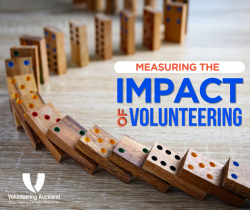Measuring the Impact of Volunteering: A New Focus for New Zealand Companies

In an era where corporate social responsibility (CSR) has become a cornerstone of business strategy, New Zealand companies are increasingly recognising the importance of their role in society.
Corporate volunteering is one of the most visible and impactful ways for businesses to contribute to the community. However, it's not just about doing good; companies are also focusing on measuring the impact of their volunteering efforts to understand the benefits not only for the communities they serve but also for employee satisfaction and overall business outcomes. This dual focus ensures that corporate volunteering is sustainable, meaningful, and aligned with both societal needs and business objectives.
The Importance of Measuring Volunteering Impact
Measuring the impact of volunteering efforts is essential for several reasons:
-
Accountability and Transparency: Stakeholders, including employees, customers, and investors, are increasingly demanding transparency in CSR activities. Companies need to demonstrate that their efforts are genuine and that they have a tangible positive impact on society.
-
Aligning with Business Goals: By measuring the impact, companies can ensure that their volunteering programmes align with their broader business objectives, such as enhancing brand reputation, building customer loyalty, and attracting top talent.
-
Employee Engagement and Satisfaction: Understanding how volunteering impacts employee satisfaction and engagement helps companies to build a more motivated and committed workforce.
-
Continuous Improvement: Measurement provides insights into what works and what doesn’t, allowing companies to refine and improve their volunteering programmes over time.
Methods of Measuring Impact
New Zealand companies are adopting a variety of methods to measure the impact of their volunteering programmes. These include both qualitative and quantitative approaches:
-
Surveys and Feedback: Employee surveys are a common tool to gauge the impact of volunteering on job satisfaction and morale. Feedback from community partners and beneficiaries helps companies understand the direct impact of their efforts.
-
Key Performance Indicators (KPIs): Companies set specific KPIs related to volunteering, such as the number of volunteer hours contributed, the number of employees participating, and the outcomes achieved for community projects.
-
Social Return on Investment (SROI): SROI is a framework for measuring the broader social, environmental, and economic value created by volunteering. It helps companies quantify the benefits of their activities in monetary terms.
-
Case Studies and Storytelling: Qualitative data in the form of case studies and personal stories can provide powerful insights into the impact of volunteering. These narratives help illustrate the human side of the impact.
New Zealand Companies Leading the Way
Several New Zealand companies are at the forefront of measuring the impact of their corporate volunteering programmes, setting examples for others to follow.
-
Air New Zealand: Air New Zealand has a well-established corporate volunteering programme that focuses on environmental sustainability, youth development, and supporting local communities. The airline measures its impact by tracking the number of volunteer hours contributed, the reach and outcomes of its projects, and feedback from both employees and community partners. Through its employee volunteering programme, Air New Zealand staff can volunteer in various environmental projects, which has been linked to increased employee engagement and job satisfaction.
-
ANZ Bank: ANZ Bank has integrated volunteering into its corporate culture, encouraging employees to take paid volunteer leave to participate in community projects. ANZ measures the impact of its volunteering efforts by using a combination of employee feedback, KPIs, and impact assessments. The bank’s focus is on financial literacy, supporting education initiatives, and improving mental health. By measuring the outcomes of these programmes, ANZ can demonstrate the real-world benefits of its volunteering efforts, both for the community and for its staff, who report higher levels of pride and fulfillment.
-
Fonterra: Fonterra’s volunteering initiatives are closely linked to its sustainability goals. The company’s “Good Together” programme encourages employees to volunteer in local environmental and educational projects. Fonterra uses SROI to measure the impact of these initiatives, capturing data on environmental improvements, community engagement, and employee development. The company has found that employees who participate in volunteering activities are more engaged, which positively impacts productivity and retention rates.
The Impact on Employee Satisfaction and Business Outcomes
New Zealand companies have found that effective volunteering programmes significantly boost employee satisfaction and engagement. When employees participate in meaningful activities that align with their values, they are more likely to feel fulfilled and loyal to their employer. This sense of purpose translates into higher job satisfaction, reduced turnover rates, and a more positive workplace culture.
Moreover, the benefits extend beyond employee engagement. Companies that actively measure and report on their volunteering impact can enhance their reputation, both with customers and within the broader community. A strong reputation for social responsibility attracts customers who prioritise ethical and responsible businesses, leading to increased customer loyalty and brand advocacy.
From a business outcomes perspective, companies that integrate volunteering into their CSR strategy often see a positive impact on their bottom line. Volunteering programmes can lead to increased employee productivity, reduced recruitment and training costs due to lower turnover, and enhanced innovation as employees bring new skills and perspectives gained from their volunteering experiences back to the workplace.
Conclusion
The focus on measuring the impact of corporate volunteering is a reflection of the growing understanding that doing good is good for business. New Zealand companies are leading the way by demonstrating that volunteering is not just a nice-to-have, but a strategic asset that drives employee engagement, enhances brand reputation, and delivers tangible benefits to the community.
By continuing to measure and report on the impact of their volunteering efforts, New Zealand companies can ensure that their CSR activities are meaningful, impactful, and aligned with the values and expectations of their stakeholders. As more companies adopt this approach, the positive ripple effects will be felt across communities, workplaces, and the broader society.

